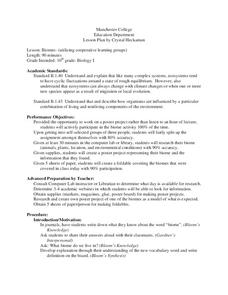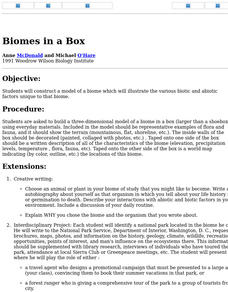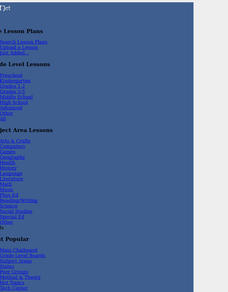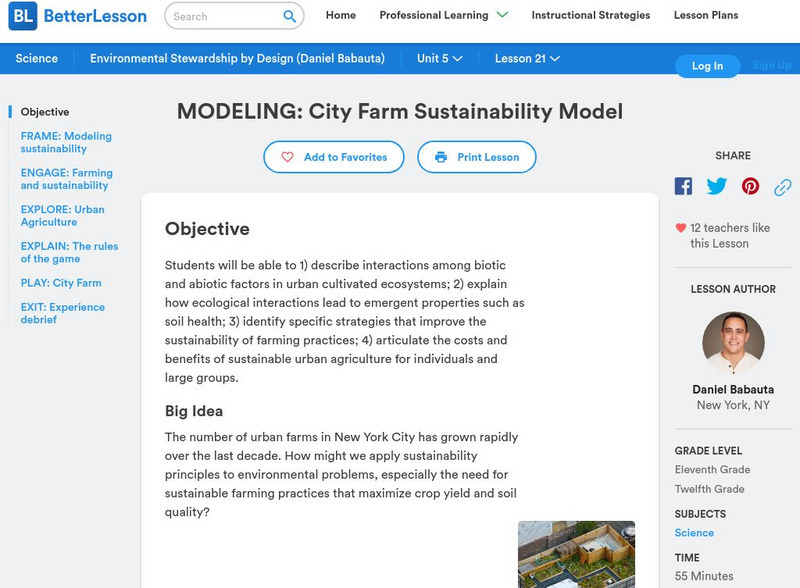Curated OER
Biomes and Plant Growth
Seventh graders design four biomes models and plant three types of seeds in them to observe growth. In groups for each type of biome, they predict the seeds' growth in each of the settings. Students follow the conditions on a biome chart...
Curated OER
Exploring Regions of Our World
Examine how climate and landforms affect plants and animals that live in particular areas. Discover that these same factors affect peoples' homes, jobs, and recreational activities. Pupils research ecosystems and biomes, and then write...
Curated OER
Biomes
Tenth graders research locations of biomes and their barriers. In this biomes lesson, 10th graders examine location, environmental conditions, and species of plants and animals that live in the biome. Students take notes and create a...
California Academy of Science
Tropical Belt
Where in the world is the equator? Explore a world map with your class, coloring in oceans, continents, and rainforests while locating the three major lines of latitude: the equator, Tropic of Cancer, and Tropic of Capricorn. Discuss how...
Curated OER
Biomes in a Box
Students construct a three-dimensional model of a biome which illustrates the various biotic and abiotic factors unique to that biome. They use everday materials to represent the important characteristics of a particular biome and then...
Curated OER
Build the Taiga: Hands on Biome-Building
Learners explore environmental awareness by completing a construction project. In this biomes lesson plan, students identify the different elements for life to thrive in an ecosystem. Learners utilize a cardboard or wood box to create a...
University of South Carolina
Home Sweet Home
Fifth graders will research a biome (land or aquatic) and create a project (diorama, model or another idea of the student's choosing) which includes the geographic features of that biome as well as plants and animals found there and...
Curated OER
Constructing A Food Web
Students identify and explain the relationships within a food web. They use index cards to glue pictures of producers and consumers. On the back of the card, students name the organism, list the type of biome in which it is found.
University of Connecticut
Building Your Own Biosphere
On September 26, 1991, four women and four men entered the scientific experiment, Biosphere 2; the doors were sealed for two years in order to study the interactions of a biosphere. In the activity, scholars explore biospheres by...
Curated OER
Environments and Ecosystems
Fourth graders create and design a model biome. In this engineering lesson, 4th graders observe the living and nonliving organisms interaction with the environment. They explain how engineers use their understanding of...
Curated OER
First Contact
Sixth graders have an opportunity to enhance their computer skills by using Internet as a resource tool and a vehicle for global interaction with other students.
Curated OER
Habitat survival
Sixth graders study different environments and how the food chain affects the survival of different animals. For this environments lesson plan, 6th graders share the visuals which describe the characteristics of the environment that they...
Curated OER
A Walk in the Woods
Eighth graders observe and identify the different levels of the forest. In this forest zones lesson students observe, identify and name a variety of forest components and describe how humans impact the forest ecosystem.
Curated OER
Structure of Earth
Seventh graders study and make a model of the significant formations of the ocean floor. They examine images and illustration and apply their imagination while creating the model. They are challenged to complete further research as an...
Alabama Learning Exchange
Alex: At Home in a Biome
This lesson plan allows students to study and learn the names and characteristics of Earth's six major biomes. The biomes are introduced with a slideshow presentation. A paper-folding poster activity gives students the opportunity to...
TeachEngineering
Teach Engineering: Environments and Ecosystems
Learners explore the biosphere and its associated environments and ecosystems in the context of creating a model ecosystem, learning along the way about the animals and resources. Students investigate different types of ecosystems, learn...
Discovery Education
Discovery Education: Habitats of the World
This site has a lesson to use to start a unit on biomes and animal habitats. This plan incorporates grasslands, temperate forests, tropical rainforests, deserts, polar ice regions, and tidepools.
TeachEngineering
Teach Engineering: Go With the Energy Flow
Students learn about energy and nutrient flow in various biosphere climates and environments. They learn about herbivores, carnivores, omnivores, food chains and food webs, seeing the interdependence between producers, consumers and...
ArtsNow
Arts Now Learning: Exploring Habitats Through Music Composition [Pdf]
For this lesson, students will learn about rondo form and practice a chant. After learning about the structure of the chant, they will work in small groups to create a chant about a habitat. The chants will then be combined with the...
TeachEngineering
Teach Engineering: A Mini World
As students learn about the creation of biodomes, they are introduced to the steps of the engineering design process, including guidelines for brainstorming. Students learn how engineers are involved in the design and construction of...
Better Lesson
Better Lesson: What Kind of Animals Live on Farms?
A activity on sustainability of urban farms in particular in New York City. Students learn how to apply sustainability principles to environmental problems. Students will look at the need for sustainable farming practices that maximize...
Alabama Learning Exchange
Alex: Beanie Baby Habitats Collaborative Project
With the booming market of "Beanie Baby" type stuffed animals being so prominent in students' lives, this project brings that interest into the classroom through the use of research, science, hands-on experiences, and technology. The...


















![Arts Now Learning: Exploring Habitats Through Music Composition [Pdf] Lesson Plan Arts Now Learning: Exploring Habitats Through Music Composition [Pdf] Lesson Plan](https://d15y2dacu3jp90.cloudfront.net/images/attachment_defaults/resource/large/FPO-knovation.png)


